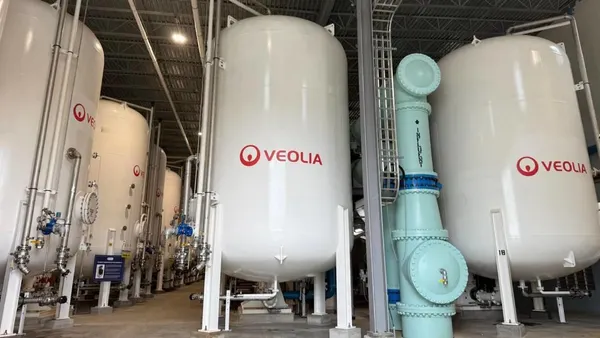Dive Brief:
- A Waste Connections district in Oregon has reached an agreement with Hood River County and the cities of Hood River and Cascade Locks to resume recycling starting July 1. Through a franchise amendment, this will mean a 2.61% rate increase and the elimination of plastics #3-7 from collection.
- These communities, together with The Dalles and Prineville, are the last in Oregon with "active disposal concurrences" granted by the state's Department of Environmental Quality (DEQ). That has allowed them to landfill material if the cost of recycling exceeds that of disposal.
- Market destabilization following China's scrap import policy triggered 26 disposal concurrences across Oregon starting in 2017. An estimated 16,030 tons have been disposed since then, however only three total concurrences remained active as of late May.
Dive Insight:
The City of Hood River initiated a new residential collection program in May 2017, which included commingled recycling, separate glass collection and curbside organics. But higher processing costs in the wake of China's scrap import policies resulted in the need to landfill commingled bins collected from residential areas shortly after.
Oregon, which shipped many of its recyclables to China, was among the first states to be heavily affected by market shifts in 2017. Rural areas in particular have seen operators struggling to move material affordably, due to most processing capacity being in the Portland area.
Jim Winterbottom, district manager at Waste Connections, told Waste Dive the reality of Oregon's transportation situation means "you can't take a [truck] 200 miles round trip [to Portland, carrying] 800 pounds of number threes and think you're going to get anything out of it."
The DEQ told Waste Dive such changes are not atypical: #3-7 plastics were the main commodities dropped from recycling programs, and rate increases in a similar range were also common. According to Winterbottom, Waste Connections has worked closely with the three jurisdictions in the Hood River area and some material will start going to processors again. Still, challenges will remain.
“I don't know that the surcharge is going to completely cover the cost of processing, let alone the transportation, but it's a start," he said. "We're keeping it out of the landfill, and [trying] to ensure some protection that it is a longer solution." Waste Connections will also work with The Dalles, a nearby community, to reach an agreement to resume recycling.
David Skakel, coordinator of the area's Tri-County Hazardous Waste and Recycling Program, said potential solutions could also include more stringent policies — such as cart-tagging programs for contamination that might lead to discontinuing service for repeat issues. Skakel is also hopeful industry can engage with other stakeholders down the road to ensure recycling is widely available — even in rural areas with higher costs.
"Where we seem to be heading is domestic capacity for reprocessing," he said. "The approach we have now is skewed towards urban environments, and it's harder to pursue that approach here."
Despite discussions of investment in new facilities, domestic processing options in the west are more limited than in other parts of the country. This has compounded challenges faced by small communities in Oregon.
"It'd be nice to get some markets [on] the west side of the Mississippi and some mill support that would allow the further growth of the processing," Winterbottom said.
CORRECTION: A previous version of this article stated that Hood River County began a new program that included organics diversion in May 2017: it was the City of Hood River, not the county.









